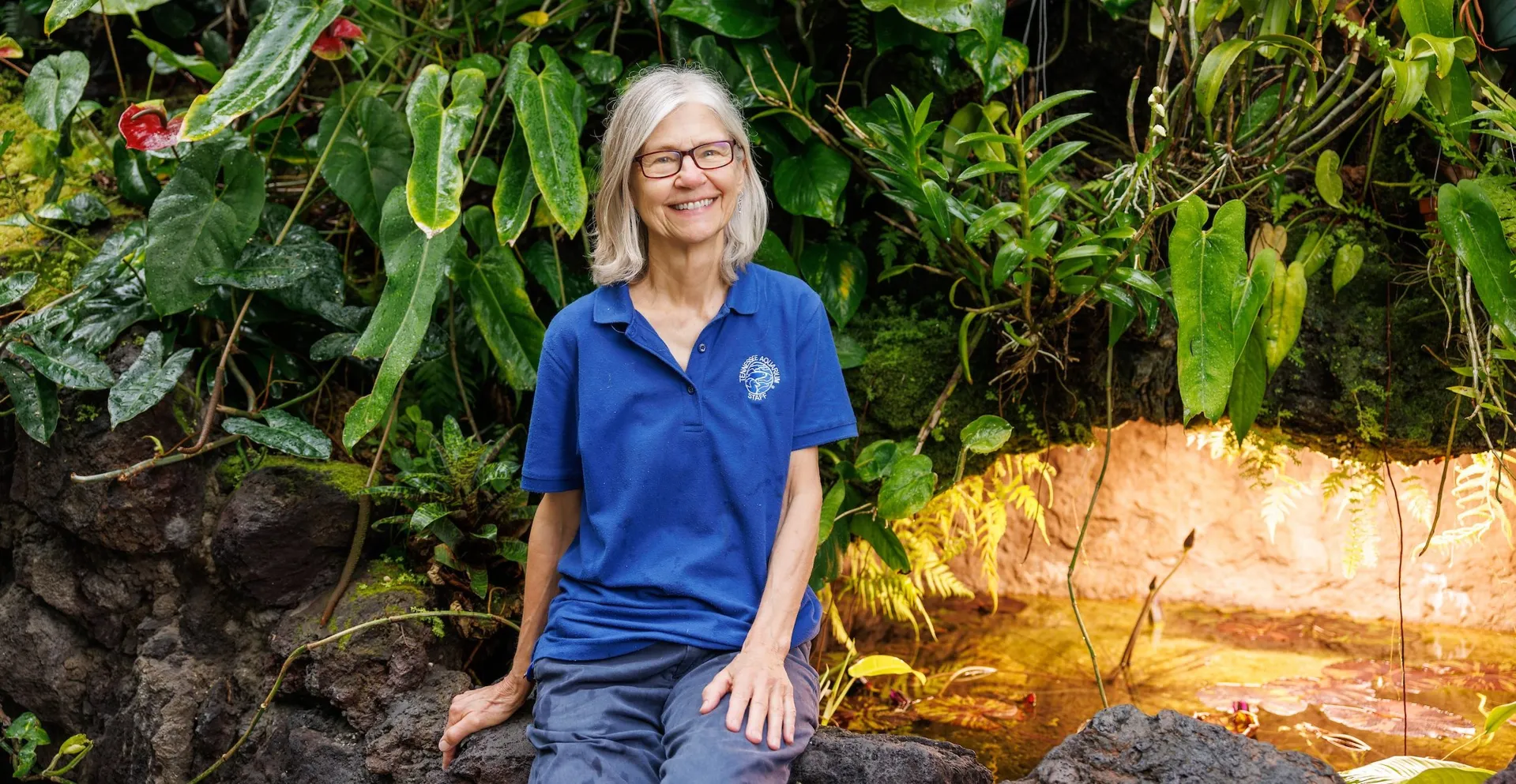Chattanooga, Tenn. (July 10, 2024) – For more than 32 years and 28 million visitors, the Tennessee Aquarium’s glass-enclosed peaks have been the signature flourish to Chattanooga’s downtown skyline.
When Senior Horticulturist Charlene Nash applied to join the Aquarium’s ranks, however, its light- and life-filled “living forest” galleries were still open to the sky.
“They lowered the giant trees in Delta Country and the Appalachian Cove Forest by crane,” Nash recalls. “They had to get those in before they put the lid on, so to speak.”
Today marks the end of Nash’s lengthy Aquarium career, which began when she responded in 1991 to a help-wanted ad in the Atlanta Journal-Constitution. At the time, she never anticipated seeing the trees she planted outgrow her.
“I was just ready for a job,” she laughs. “I was initially going to stay just three or four years and find something else to do. That didn’t work out.”
In the last 32 years, Nash has checked off a laundry list of accomplishments that would intimidate even the most ardent gardener, from designing a massive lava-rock wall to display tropical orchids to sourcing cypress knees for an alligator-filled swamp to outsmarting plant-hungry turtles. She’s even taken up hydroponic gardening under the Aquarium’s peaks to create a ready supply of organic greens, tomatoes, and other produce for animals like Ring-tailed Lemurs and Sonoran Desert Tortoises.
Nash’s main role, however, has been to act as a set dresser.
With an institutional commitment to using live plants wherever possible, Nash was tasked with selecting species that contribute to guests’ illusion of visiting far-flung habitats like a high-altitude Chinese mountain stream, an arid Malagasy spiny forest, or the deepest recesses of the Amazon.
“Since I’ve been here, it’s always been about live plants,” Nash says. “I think we have to portray the natural world since people are becoming more and more removed from it now than they ever have been.
“Even if it’s a subtle suggestion, we need to encourage our guests to appreciate the natural world.”
Ironically, for someone whose primary concern is for things with roots, Nash’s time as an Aquarium horticulturist has taken her far afield. Her many memories of working beyond the Aquarium’s downtown campus include collecting driftwood by canoe in the Florida panhandle, leading Aquarium Members on trips to England and Italy, and conducting an impromptu visit to Madagascar as site research prior to the opening of the Ocean Journey building in 2005.
Closer to home, her contributions to the Aquarium’s signature “journey from the mountains to the sea” have been numerous and vital, even if she admits they can end up being overlooked.
“The plants we use make a difference, even if the visitors don’t consciously perceive it that way,” Nash says. “If the live plants weren’t there, guests would really miss it, but they don’t notice it at the forefront. They tend to fixate on things like the fish and the snakes and the turtles.”
When she was hired, Nash was already in her early 40s and well-established in North Georgia as a horticulture and agriculture specialist. After years of working on a research farm, she transitioned into ownership of a lawn and garden consultation and landscaping business.
That her thumbs turned any shade of green came as something of a surprise, though. As a graduate student at Clemson University, she thought she was on her way to becoming a veterinarian. After graduating, she was “roped in” to teaching horticulture and agriculture courses at a vocational high school.
“That’s where I had to learn horticulture — to teach it,” she says. “I had a greenhouse and just took to it. It was a lot of fun, and I learned a lot … fast.”
Continuing to learn (and teach) has been a recurring theme throughout Nash’s horticultural career. Describing herself as driven “from the inside,” she never stops learning or expanding her skill set, particularly when it comes to soil science.
“I read and study all the time and have for years. I’m still doing it,” she says. “At night, I have a 500-page book I’m trying to wade through before I go to sleep on the organic primer and tons of things like cover crops.”
Nash has leveraged this ever-expanding expertise through her nonprofit, Soil Resources Initiative, to address food security and economic hardship in Africa.
Since 2011, she has participated extensively in overseas farmer-to-farmer programs overseen by the National Cooperative Business Association and Citizens Network for Foreign Affairs. As a representative for these organizations, Nash has made more than 16 trips to nations such as Mozambique, Senegal, and Zambia.
During these visits, she brought seeds and tools for farmers and instructed them in regenerative agricultural techniques such as composting and cover crops. Through her workshops, she aimed to help farmers improve their yields and raise plants that offered organic alternatives to store-bought medication and other products.
In 2016, Nash received national recognition for her tireless efforts to improve the lives of families who struggle to survive in a region with soils that have been ravaged over time by a harsh climate and agricultural misuse. Volunteers for Economic Growth Alliance (VEGA), a Washington D.C.-based consortium, selected Nash as their volunteer of the year as a result of her “outstanding service” in providing agricultural expertise and assistance.
“You just keep educating and hope you can make a difference,” Nash says. “It has far-reaching benefits.”
As her time at the Aquarium comes to a close, Nash says she’s looking forward to continuing her involvement in projects and — of course — learning. Even if she doesn’t like to use the word, retirement doesn’t have to mean an end to self-improvement, she says.
But first and foremost, after 30 years of tending to the Aquarium’s plants, it’s high time her own on Signal Mountain gets some loving.
“My intentions are to organize my house and weed the garden,” Nash laughs. “Things are out of control.”
